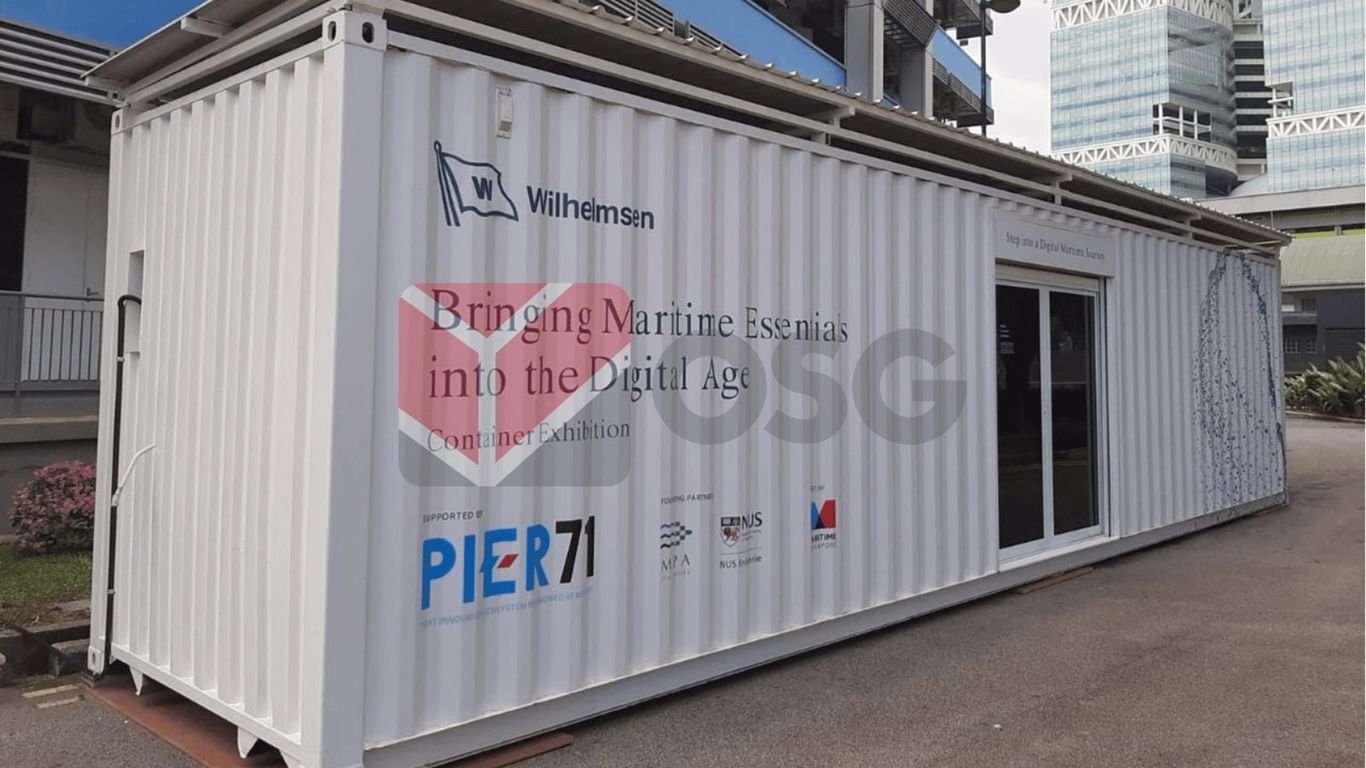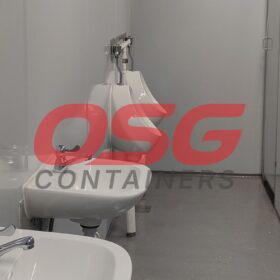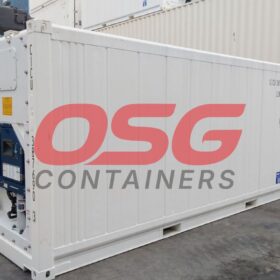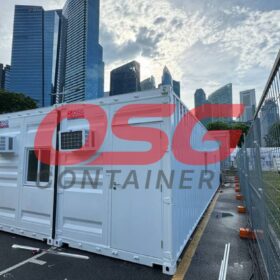These days, businesses are getting pretty creative with how they use space. Forget just shipping stuff around the world; the humble shipping container has become a real workhorse for companies. They’re tough, secure, and you can put them almost anywhere. It’s pretty cool to see how many different ways businesses are putting these metal boxes to work, saving money and getting things done.
Key Takeaways
- Businesses use shipping containers for on-site storage, offering a secure and portable solution for inventory and equipment.
- Modified shipping containers serve as temporary or permanent office spaces, providing cost-effective workspaces for various projects.
- Pop-up shops and retail stores are frequently set up in shipping containers, allowing businesses to test new locations or cater to seasonal demand.
- Shipping containers can be transformed into functional workshops, studios, or even cafes, offering unique and adaptable commercial spaces.
- The durability and portability of shipping containers make them suitable for essential services like mobile clinics and emergency shelters.
1. On-Site Storage
When you need extra space, a shipping container is a super practical solution. Think about it: instead of trying to cram everything into your existing building or paying for off-site warehousing, you can just get a container delivered right to your property. These steel boxes are tough and weather-resistant, making them perfect for storing tools, materials, inventory, or even equipment. They’re way more affordable than building an extension, and you can get them in various sizes, like the common 20ft or 40ft options. Plus, if you ever move locations, you can just take your storage with you. It’s a flexible way to manage your space needs without a huge commitment. Some businesses even use specialized containers like open top containers for easier loading of bulky items, or isotank containers if they need to store liquids safely on-site. It really simplifies things when you have a lot of stuff that needs to be kept secure and accessible.
Using a shipping container for on-site storage means you have immediate access to your goods or equipment without the hassle of long-distance transport or the expense of permanent construction. It’s a straightforward way to add functional space exactly where and when you need it.
Here are a few reasons why on-site storage containers are so popular:
- Cost-Effective: Significantly cheaper than building new structures or renting traditional warehouse space.
- Security: Made of durable steel with lockable doors, offering robust protection against theft and the elements.
- Flexibility: Easily moved to different locations on your property or to a new site altogether.
- Accessibility: Keep your inventory or tools right where you need them, saving time and effort.
Businesses often find that renting a container is a great way to test out the need for extra space before committing to a purchase, and you can find great deals on shipping container warehousing options.
2. Temporary Office Space
Need a place to work that isn’t your kitchen table? Shipping containers are stepping up as a really practical solution for temporary office needs. Think about construction sites, event management, or even just needing a quiet spot away from the main office for a special project. These container offices are pretty neat because you can set them up pretty quickly.
They’re way cheaper than renting a traditional office, especially if you only need it for a short time. Plus, you can put them just about anywhere. We’re talking insulation, electricity, maybe even some AC – they can be kitted out to be quite comfortable.
Here’s why they make sense:
- Speed of Deployment: Get a functional workspace up and running much faster than traditional construction.
- Cost Savings: Significantly lower costs compared to leasing or building permanent structures.
- Flexibility: Easily relocate or reconfigure the space as your project or needs change.
- Durability: Built from sturdy steel, they offer a secure environment for your team and equipment.
Businesses are finding these adaptable spaces are perfect for everything from remote work setups to field operations. They offer a solid, secure environment that can be customized to fit specific requirements, making them a smart choice for many companies.
Many companies are turning to these modified containers for their adaptability and cost-effectiveness. You can find ready-made container offices that can be delivered right to your location, saving you a lot of hassle.
3. Pop-Up Shops
Pop-up shops are a fantastic way for businesses to test the waters in new locations or create a temporary buzz around a product or event. Think of them as short-term retail experiences, often set up for a few days, weeks, or even just a weekend. Shipping containers are perfect for this because they’re relatively easy to move and set up. You can place them at festivals, busy street corners, or even as an extension of an existing store.
These temporary retail spaces offer a unique, often industrial-chic aesthetic that customers find appealing. They’re also a great way to sell seasonal items, like holiday decorations or summer beach gear, without committing to a long-term lease. Plus, you can really get creative with the design. Businesses often brand the exterior with eye-catching graphics and customize the interior with shelving and lighting to match their specific needs. It’s a flexible and cost-effective approach to exploring new markets or running a seasonal business.
Here’s why they work so well:
- Portability: Easily moved to high-traffic areas or special events.
- Cost-Effectiveness: Significantly cheaper than traditional retail leases.
- Customization: Can be designed to reflect brand identity and product display needs.
- Novelty: The unique setup often attracts customer attention.
Setting up a pop-up shop in a container means you can experiment with different locations and customer bases without a huge financial risk. It’s a smart move for brands looking to create a memorable, temporary presence.
4. Retail Stores
Shipping containers have really opened up new doors for people wanting to start their own retail businesses. Forget about the massive upfront costs of traditional buildings; these steel boxes offer a way to get your shop off the ground without breaking the bank. They provide a unique, eye-catching storefront that can really make a small business stand out.
Think about it: you can set up a boutique clothing store, a quirky gift shop, or even a cozy bookstore. The flexibility is a huge plus. If your business grows, you can often stack containers or add more units to expand your retail space. It’s a smart way to scale up without being tied down by a long-term lease on a huge building.
Here are a few types of retail businesses that are finding success with container shops:
- Clothing boutiques
- Jewelry shops
- Bookstores
- Gift shops
- Secondhand and thrift stores
Many cities are even looking at these container stores as a way to boost local economies and encourage new businesses. It makes entering the retail market much more accessible for more people. You can find suppliers who offer customizable options, allowing you to create a space that truly reflects your brand. It’s a practical approach for anyone looking to establish a physical presence, and you can even find great deals on prefabricated site offices that can be adapted for retail use.
The cost-effectiveness and adaptability of shipping containers make them a game-changer for small retail ventures. They allow entrepreneurs to test markets, experiment with locations, and grow their business organically.
5. Coffee Shops
Forget those big chain coffee shops for a minute. There’s a whole movement of smaller, independent coffee spots popping up, and many are using shipping containers. It makes a lot of sense, really. You don’t need a massive building to serve great coffee and create a cozy spot for people to hang out. A shipping container gives you just enough space for a counter, some back-end storage, and a few tables.
These container cafes offer a unique, industrial-chic vibe that customers love. It’s a big part of the appeal, making them feel more authentic and less corporate. Plus, the cost savings compared to traditional construction can be pretty significant, which is a huge plus when you’re just starting out.
Here’s a quick look at what makes them work:
- Compact Footprint: Perfect for busy urban areas or spots where space is limited.
- Quick Setup: Much faster to get up and running than a brick-and-mortar building.
- Customizable Design: You can really make it your own, inside and out.
- Lower Overhead: Reduced construction and utility costs compared to traditional buildings.
It’s not just small businesses either; even major players are getting in on this trend. You’ll find these converted containers popping up everywhere, from busy city streets to local parks, becoming popular community gathering spots. They really do add a cool, creative element to the coffee scene. If you’re thinking about opening your own coffee business, definitely look into shipping container cafés as a viable option.
6. Secure Equipment Storage
When you’ve got valuable tools, machinery, or sensitive electronics that need safeguarding, especially at a remote job site or in an area prone to theft, a shipping container is a solid choice. These steel boxes are built tough, designed to withstand rough seas and even rougher weather, which means they’re also great at keeping your gear protected from the elements. Think about a standard 20 ft container; it offers a good amount of space for a variety of equipment, and its robust construction makes it a secure vault on wheels.
Businesses often use these for:
- Construction equipment and materials
- Agricultural machinery
- Landscaping tools and supplies
- Event production gear
- Inventory for remote operations
A 20 foot sea container provides a durable, lockable, and weather-resistant solution for protecting your assets. You can even outfit them further with shelving, lighting, or advanced security systems to really tailor them to your specific needs. It’s a much more practical and secure option than leaving expensive items out in the open or relying on flimsy temporary structures. Plus, their portability means you can move your secure storage right where you need it, whether that’s across town or across the country. Renting freight containers can be a smart move for businesses needing temporary, secure storage without the commitment of a permanent building.
The sheer strength of the steel construction means that once locked, your equipment is generally safe from tampering and the weather. This peace of mind is invaluable when dealing with costly assets.
7. Workshops and Studios
For artists, makers, and anyone who needs a dedicated space to create, shipping containers offer a surprisingly practical solution. Forget about trying to cram your projects into a corner of the garage or paying high rent for a commercial studio. These sturdy metal boxes can be transformed into functional and inspiring workshops or studios.
Think about it: you get a blank canvas, a secure structure, and the flexibility to set it up almost anywhere. Whether you’re a painter needing good light, a woodworker requiring space for tools, or a sculptor needing room to move, a container can be adapted. Many people find that a single 20 ft container is enough to get started, but you can always combine them for more space. Some folks even add extra windows or skylights to bring in natural light, which is a big plus for creative work.
Here are a few ways people are using them:
- Art Studios: Perfect for painters, sculptors, and digital artists who need a quiet, dedicated space away from home distractions.
- Woodworking Shops: The durable nature of containers makes them suitable for housing tools and projects, and they can be outfitted with ventilation for dust control.
- Maker Spaces: Ideal for hobbyists and small businesses involved in 3D printing, electronics, or crafting.
- Photography Studios: With some modifications for lighting and backdrops, containers can become private photo studios.
Setting up a workshop in a shipping container means you can often avoid the hassle of long-term leases and expensive renovations. You can customize the interior to suit your specific needs, from adding workbenches and shelving to installing specialized ventilation or electrical systems. It’s a way to get your creative business off the ground without breaking the bank.
These spaces are also great for small businesses that need a place to repair items, like a bike repair shop or an electronics repair service. The ability to customize the space means you can create an efficient workflow, making your business run smoother. It’s a smart way to get a professional workspace without the traditional overhead.
8. Educational Facilities
When schools need more space, especially for temporary needs or in areas where traditional construction is difficult, shipping containers offer a smart solution. They can be quickly set up as classrooms, labs, or administrative offices. This is a big help for school districts that are growing or undergoing renovations.
Think about it: instead of waiting months for a new building, a container classroom can be ready in weeks. They provide a secure and weather-resistant environment, much like a standard building, but with a lot more flexibility. Plus, they can be moved if the school needs to relocate or expand in a different direction.
Here are some ways containers are used in education:
- Temporary Classrooms: Perfect for when enrollment surges or main buildings are being repaired.
- Specialty Labs: Science labs, art studios, or computer rooms can be outfitted in containers.
- Administrative Offices: Providing much-needed office space for teachers and staff.
- Daycare Centers: Creating safe and contained spaces for younger children.
The adaptability of these structures means they can be configured to suit various educational needs, from early childhood learning to specialized vocational training. They offer a cost-effective way to add capacity without the long-term commitment of traditional building projects.
Many institutions are finding that these repurposed containers are a practical way to meet their space requirements. It’s a way to get functional learning environments up and running fast, which is a win for students and educators alike. This approach can be particularly useful for schools in rural areas or for specialized programs that need a dedicated, standalone space.
9. Mobile Clinics
Shipping containers are really stepping up to help with healthcare access, especially in places that don’t have many doctors or hospitals nearby. You can take a standard shipping container and turn it into a fully functional clinic. Think about it: you can equip it with examination rooms, a small lab, and even a place for basic procedures. Because they’re built tough and can be moved around, these container clinics can go where they’re needed most, like rural areas or places hit by a natural disaster. It’s a smart way to get medical help to people who might otherwise go without.
These mobile units are pretty adaptable. You can set them up for different kinds of medical needs:
- General Check-ups: Basic examination rooms for routine visits.
- Vaccination Drives: Space to administer vaccines to communities.
- Specialty Services: Can be outfitted for specific needs like dental care or vision testing.
- Emergency Response: Deployed quickly to provide immediate medical aid after an event.
The portability of these structures means healthcare can reach underserved populations efficiently. It’s a practical solution for expanding medical reach without the massive cost of building permanent structures. Many companies now offer pre-fabricated container clinics, or you can work with a custom builder to get exactly what you need. It’s a growing trend that’s making a real difference in how people access healthcare, offering a flexible and cost-effective way to bring medical services directly to communities. You can find out more about repurposing containers for various uses on shipping container projects.
10. Emergency Shelters
When disaster strikes, quick and reliable shelter is a top priority. Shipping containers are proving to be a solid option for emergency housing. Their tough steel construction means they can withstand harsh weather, and they’re built to be moved around easily. This makes them ideal for getting help to people fast when they need it most.
These containers can be set up pretty quickly, offering a safe place for folks to stay. They can be outfitted with basic necessities like beds, sanitation facilities, and even simple power sources. Think of them as sturdy, temporary homes that can be deployed wherever there’s a need, whether it’s after a hurricane, earthquake, or other crisis.
- Rapid Deployment: Containers can be transported and set up much faster than traditional temporary structures.
- Durability: Their robust design protects occupants from the elements.
- Modularity: Multiple containers can be linked together to create larger communal spaces or individual family units.
- Cost-Effectiveness: Compared to other emergency housing solutions, they can be a more budget-friendly option.
The ability to quickly provide safe, weather-resistant shelter is a major advantage in disaster response. Shipping containers offer a practical way to meet this immediate need.
Many organizations are looking at these as a way to provide immediate relief. They’re a practical solution for getting people out of harm’s way and into a secure space. It’s a smart way to use existing infrastructure to help communities recover after a disaster.
Wrapping It Up
So, as we’ve seen, shipping containers are way more than just boxes for stuff. Businesses are really getting creative with them, using them for everything from extra storage on-site to cool pop-up shops and even offices. They’re tough, they’re pretty affordable, and you can move them around, which is a big deal for a lot of companies. It’s pretty neat how these old metal boxes can be changed into something useful for so many different kinds of businesses. It just goes to show that with a little imagination, you can find new ways to make things work, even with something as simple as a shipping container.
Frequently Asked Questions
What makes shipping containers a good choice for businesses?
Shipping containers are tough and can handle bad weather. They’re also pretty cheap to get and can be moved around easily. Plus, they’re strong and secure, keeping your stuff safe.
Can I use a shipping container as a temporary office?
Absolutely! You can turn a shipping container into a comfy office with things like lights, heat, and a desk. It’s a fast and affordable way to get a workspace, especially for projects that don’t last too long.
Are shipping containers good for storing business equipment?
Yes, they are! They’re like a super secure metal box that you can put right where you need it. This is great for keeping tools, machines, or other gear safe, especially if you work in a place where things might get stolen.
How can businesses use shipping containers for retail?
Businesses use them as cool pop-up shops or even permanent stores. You can decorate them to look great and sell your products. They’re a unique way to attract customers and don’t cost as much as a regular store.
Are shipping containers eco-friendly?
Using old shipping containers helps the environment because it means fewer new materials like wood or concrete are needed. It’s a smart way to reuse something that’s already been made.
Can shipping containers be used for more than just storage or shops?
Definitely! People are using them for all sorts of things, like classrooms, art studios, coffee shops, and even as places to get medical help in areas that don’t have many doctors. Their uses are pretty much endless!
 Singapore
Singapore Australia
Australia Indonesia
Indonesia Japan
Japan Malaysia
Malaysia New Zealand
New Zealand Philippines
Philippines South Korea
South Korea Taiwan
Taiwan Thailand
Thailand VIETNAM
VIETNAM




